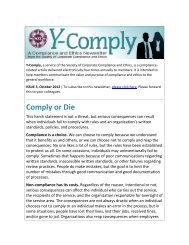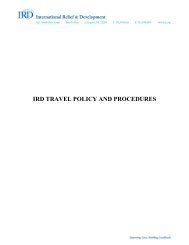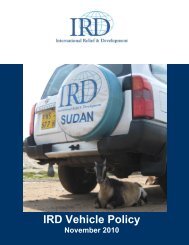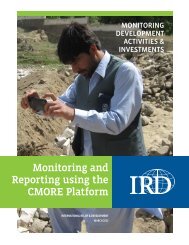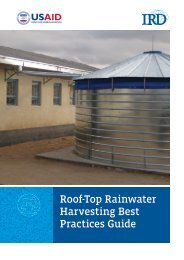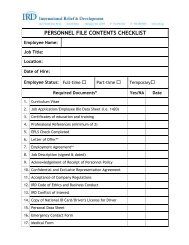IRD Vehicle Policy - International Relief & Development
IRD Vehicle Policy - International Relief & Development
IRD Vehicle Policy - International Relief & Development
Create successful ePaper yourself
Turn your PDF publications into a flip-book with our unique Google optimized e-Paper software.
Title: <strong>Vehicle</strong> <strong>Policy</strong> Effective Date: 11/22/10<br />
Introduction<br />
The <strong>IRD</strong> <strong>Vehicle</strong> <strong>Policy</strong> 1 is intended to provide guidance on all aspects of the use and maintenance of<br />
<strong>IRD</strong> vehicles and associated equipment and a series of instructions that must be adhered to at all times<br />
for the safety of <strong>IRD</strong> personnel. If any aspect of this policy is not understood or, for any reason, cannot<br />
be complied with, the Chief of Party/Country Director (COP/CD) must immediately seek further<br />
guidance and instruction from <strong>IRD</strong> Director of Risk Management and Global Security and not make any<br />
assumptions that could endanger the safety of <strong>IRD</strong> staff or allow a vehicle to be operated outside the<br />
parameters of the relevant donor’s regulations and policies.<br />
Start-up Activities<br />
All projects require some transportation to conduct business, so one of the first meetings in country will<br />
be to discuss this policy, vehicle acquisition (lease, purchase, and waiver requirements), staff use of<br />
vehicles, and related insurance requirements. Any other project vehicle specifications will be developed<br />
with the COP and based upon the donor and client requirements, the terms and conditions of the funded<br />
agreements as well as project needs. A vehicle control system will be established as soon as possible<br />
and before vehicles are in use, including a document file for each vehicle that will be comprised of<br />
registration and insurance certificates, shipping documents, accident reports, vehicle travel and<br />
maintenance logs, and any other essential documents related to the vehicle.<br />
Expatriates are not authorized to drive vehicles as a rule except in life threatening situations. In some<br />
countries expats may receive written authorization to drive from headquarters, and in certain emergency<br />
response start ups.<br />
There are three basic options for transport:<br />
1. Take local transport, such as taxicabs. This is an option if the project requires no or very few<br />
trips outside the city in which the project office is located, and excellent public transport is<br />
regularly available. If this is the most reasonable option, you may want to establish a<br />
relationship with a number of local drivers that can be called when needed so that you do not<br />
have to rely on random cab drivers in the city. To the extent possible make sure that you use<br />
licensed taxicabs. Frequently, local transportation, such as buses, may not be safe. Consult with<br />
HQ or local security officer before taking local transportation.<br />
2. Hire one or more drivers who provide their own autos to accommodate the travel needs of<br />
staff both within the project city and for longer-distance project trips. This may be the preferred<br />
option when it is difficult to purchase a U.S.-manufactured car in country or to bring one in. It is<br />
critical that project management monitor maintenance and service of the vehicles. In general,<br />
funds for maintenance and service are paid to the driver via the U.S. government-approved<br />
mileage rate, as translated into local currency. You may want to set up differential rates for<br />
intra-city vs. inter-city trips. <strong>Vehicle</strong> logs must be maintained so that travel documentation is<br />
available for support of billing and expenses and (where pre-approved by USAID) for personal<br />
use reconciliation for reimbursement back to the project. Cars and drivers should be in<br />
compliance with local laws related to vehicles such as insurance, registration, and/or licensing.<br />
Verify compliance by asking to see the documentation. Where possible, attempt to hire vehicles<br />
1 Sections adapted from <strong>IRD</strong> Security <strong>Policy</strong> unless otherwise noted<br />
Notice: A printed copy of this document may not be the latest version.<br />
Available online: https://portal.ird.org<br />
Updated: January 2011 3


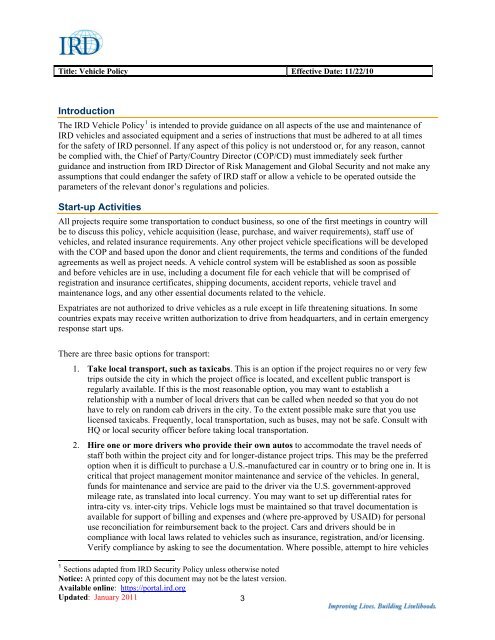
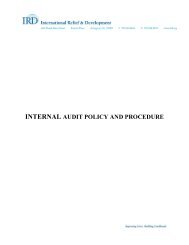
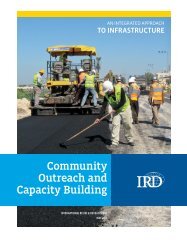
![Guide bonne pratique production d'oignon qualité_VF_4_2411012[1]](https://img.yumpu.com/23506639/1/184x260/guide-bonne-pratique-production-doignon-qualitac-vf-4-24110121.jpg?quality=85)

